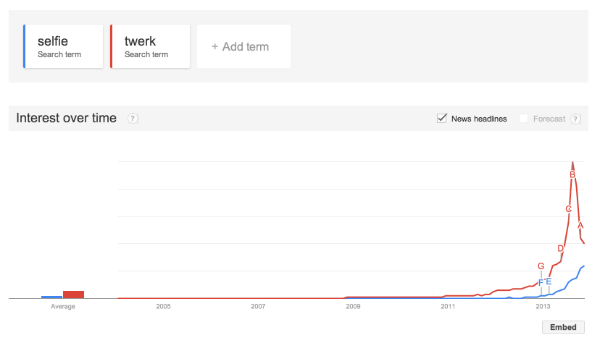Robin Thicke and Miley Cyrus perform onstage during the 2013 MTV Video Music Awards at the Barclays Center on August 25, 2013
Twerk advocates went to work this week when Oxford Dictionaries announced that their word of the year had nothing to do with the gyrations of Miley Cyrus. Instead, the editors anointed selfie as the term that best summed up culture as we know it in 2013. TIME’s own Lily Rothman wrote a column proclaiming that twerk was “robbed” of the honor. But a conversation with the head editor of another dictionary sheds some light on why lexicographers are still wary of the term.
This week, American Heritage Dictionary announced all of their additions for 2013. Among their new words and phrases was selfie. “We don’t enter that many words from pop culture,” says executive editor Steve Kleinedler. “When we do they are ones that tend to be very widespread, very ubiquitous, used without further explanation.” And selfie, he says, is an example of a word that has become organically popular in a short period of time. “It’s a good word that shows the pulse of the nation,” he says.
Selfie has been on a slow-and-steady march into mainstream usage, describing an action and thing that people actually deal with in daily life. That’s not so much the case for twerking. “There are some words that are being talked about as words rather than used in the natural course of day-to-day living,” Kleinedler says. “Twerk has been around a long time, and even though it became more widespread this year, that widespreadness is very likely flash-in-the-pan.”
In 2013, a person using the word selfie likely had an interest in selfies, while a person using the word twerk likely had an interest in a certain pop starlet. Google Trends, for instance, show an explosion of searches for twerk in August that handily eclipses those for selfie. But it also shows a steep decline in the months after Cyrus’ twerking incident at the MTV Video Music Awards. Selfie continues on its gradual upward slope.
In Oxford’s description of what warrants being “word of the year,” editors explain that the term must “have lasting potential as a word of cultural significance.” Twerking may turn out to be a pillar in our pop culture, but it might also be 2013’s “rickrolling“—an infectious but ultimately fleeting obsession. That’s why, according to Kleinedler, the word remains on American Heritage’s “watch list” instead of in its pages for now, alongside other candidates like click bait and bankster.
Here are some of the other new terms that made the cut in American Heritage this year:
autocomplete (n.): a function, as on a search engine, that supplies one or more options of predicted words or phrases beginning with the characters that a user has already entered.
couch surf (v.): to stay as a guest at another’s house or at various houses in succession, especially when sleeping on a sofa or on the floor.
crema (n.): the light brown foam on top of a serving of espresso.
drifting (n.): a technique in motorsports in which the driver briefly oversteers at the start of a turn, causing the rear of the vehicle to enter a controlled lateral skid until the turn is complete.
photobomb (v.): to move unexpectedly and quickly into the frame of a photograph that is being taken of someone or something.
session beer (n.): a relatively low-alcohol beer suitable for consumption over the course of a long session of drinking.
This is an edition of Wednesday Words, a weekly feature on language. For the previous post, click here.







